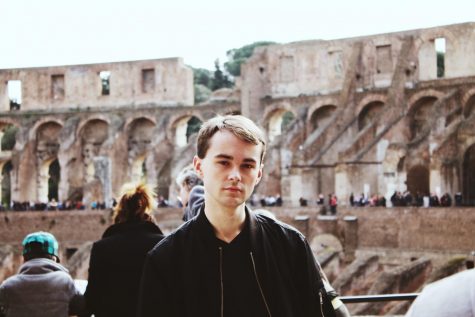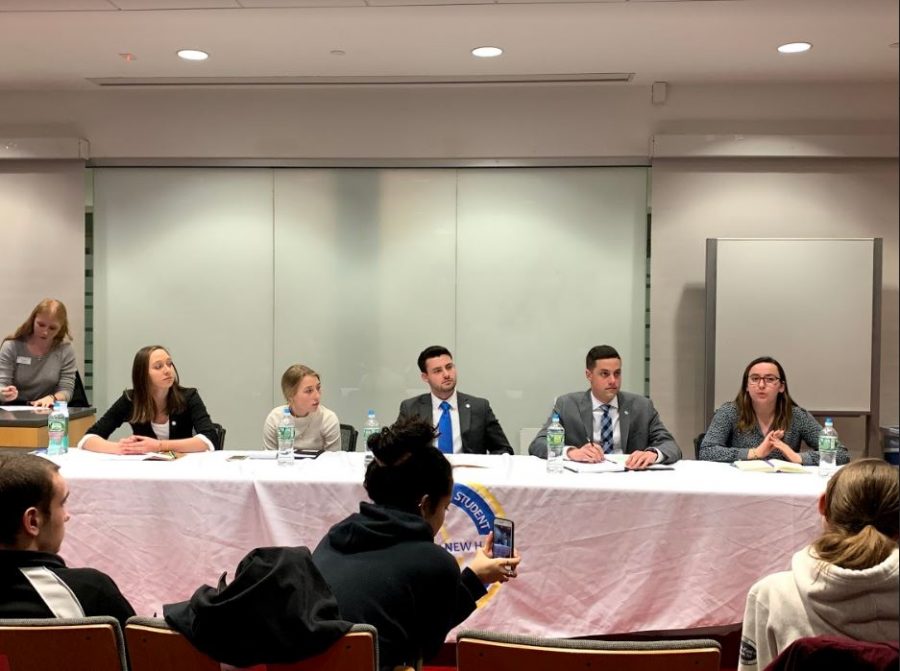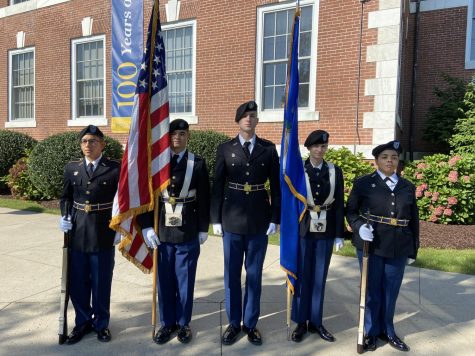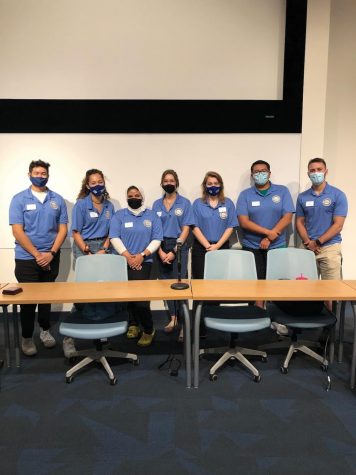USGA Treasurer and President Candidates Debate
Photo by Everett Bishop/The Charger Bulletin
The five candidates for USGA president debated and discussed their individual platforms.
The Undergraduate Student Government Association (USGA) hosted the first round of their debates on Wednesday, Feb. 13 in the Henry C. Lee building. Candidates for USGA treasurer and president were given a chance to answer questions about what qualified them for the position and to share their platform with the student body.
Running for treasurer are sophomore psychology and criminal justice major, Cody Ruais, and sophomore communication, film, and media studies major, Angelo Prevosto. Both stated that they were qualified for the job because of their experience in the treasurer’s office. Ruais has been shadowing current USGA treasurer, Ian Maloney, since Nov. 2018 while Prevosto is currently the treasurer’s assistant. Among their qualifications, both also shared that they understood the new Charger Finance System, an electronic budgeting tool that the treasurer’s office would be switching over to come next semester.
One of the biggest issues discussed during the debates for USGA treasurer was increasing the yearly budgets for blue status organizations to over $500.
“I think what’s important when you’re going to expand this kind of budgeting that has been in place for years is that you do your research,” said Ruais. “So one thing that I’d like to do is that I’d like to reach out to all of the blue status organizations on campus, see how they use their finances this year, see if there’s anything they weren’t able to do. If I am elected treasurer, I would do a lot of work over the summer and kind of prepare for the next year and possibly change that policy.”
While Ruais is considering outreach, Prevosto has a larger change in mind.
“I want to create a lot of opportunities for blue status RSO’s and I think the best way to do this is through the miscellaneous account,” said Prevosto. “I think it would be beneficial to keep the yearly budget process relatively the same in terms of requesting funding because there is a strict 1.7-million-dollar budget. I’m still doing research, but I think letting blue status RSO’s request money from the miscellaneous account for 1 or 2 events out of the year, outside of their $500 cap, so this will allow them to have at least 1 or 2 big events on campus.”
Another topic was the issue of diversity in the budget committee. According to Prevosto, “interest goes further than knowledge” when working with USGA, and that making a “more diverse budget committee” will only help in making the “best USGA possible.”
After the conclusion of treasurer debates came USGA presidential debates. Candidates included junior university students Merranda Zehner, John Matyasich, Christina Genovese, Ian Maloney, and Kenzie Whiting. Candidates all previously held positions in USGA, whether in the house, senate, or e-board.
One of the biggest issues addressed by the presidential candidates was USGA’s outreach to the greater student body.
“Since USGA has become my identity more so, I don’t really identify with a specific RSO on campus, but more so being a voice for the student body,” said Zehner. “I’ve seen the ins and outs for three years and I’ve always been proud of being a resource for people. We have to reach out to students we don’t see on a day to day basis, and get their feedback.”
Genovese also agreed with Zehner’s idea of reaching out to the wider student body, claiming that “transparency” within USGA is the best policy, and voicing her idea that livestreaming meetings so that interested students may watch would be beneficial.
“You don’t have a sense of a voice more or less because you feel as though the executive board and the senate have more of a voice because they’re so vocal within USGA,” said Whiting. “But I want to be able to use my voice to tell others that they can use theirs.”
Outreach issues also included problems incorporating groups with less of a presence in USGA such as ROTC and university sports teams. The issue of including part-time students more into USGA also came up, however, Maloney pointed out that in a survey of part-time students, a majority of them wanted to “go to class and go home.”
“At the end of the day, the biggest thing is how can we involve our students and how we can get them to be part of the solution so that these solutions don’t last one year, but so that they last forever,” said Matysich. “We’re looking to cultivate a leadership here of students who continue to transform our university, not just while we’re, here but far after we’re gone.”
*Christina Genovese is also the Community Engagement Editor for The Charger Bulletin.*

Everett Bishop is a senior at the University of New Haven and is student life editor for The Charger Bulletin. He is double majoring in communications...










